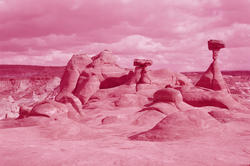Husband-and-wife educators endawnis Spears and Cassius Spears, Jr. kick off the Liberal Arts division’s spring lecture series.
Deep Dive into Block Island Ecology

How do cultural history and environmental justice play a part in the ecosystem of Block Island, a popular summer destination that sits 12 miles off the coast of Rhode Island? Students participating in a weeklong intensive designed by scientists in RISD’s Edna W. Lawrence Nature Lab recently sought answers to such questions. Made possible by an anonymous donation from a generous RISD alum, the Block Island Experience centered around the island’s local ecology, diversity of life and Indigenous connections to the land.

“This trip was an opportunity to create a dream scenario for hands-on learning,” says Jennifer Bissonnette, who leads the Nature Lab. “Our aim was to help students incorporate a ‘decolonized’ understanding of the natural world into their art and design practices by studying the land’s history and its historical and present relationship with Indigenous peoples.”
“This trip was an opportunity to create a dream scenario for hands-on learning.”
Students stayed at the Barrington Inn overnight but were busy almost every moment of each day with experiential activities, lectures by visiting experts in Indigenous history, local ecology and environmental justice, hours of sketching, and activities that helped them bond as a group. In the field, students banded birds, collected plankton and waded deep into the sea to catch and tag horseshoe crabs. Artist and natural science illustrator Amy Bartlett-Wright guided many sketching sessions throughout the week, and students even learned to square dance with caller Will Mentor, concertina player Ben Gagliardi and noted fiddler Armand Aromin at the Old Island Pub.

In all of their investigations, students attempted to approach nature through an environmental justice lens. History, Philosophy and the Social Sciences faculty member Bonnie Epstein Silverman led workshops on island geology and renewable energy, and students learned about the Indigenous perspective on ways of knowing and being with the land from guest lecturers Maryann Mathews, Lorén Spears, endawnis Spears and Cassius Spears, Jr.


“The conversations and unexpected tangents were possibly even more informative than the planned lessons,” says rising sophomore Benton Perry 25 FAV. “I really appreciated the immersive aspect of the trip and the community we created with individuals of all different backgrounds and stages in life.”
Naomi Canino MLA 24 also remarked on the value of unplanned learning. “Things were unpredictable, but in a good way,” she says. “When we set out to tag horseshoe crabs, we were looking for females, but we could only find males. When we finally found a female, she had eggs. So, our objective changed completely while we were out there.”

Canino found being a part of this immersive community inspiring and says that since returning to the mainland she has made quiet observation and sketching part of her daily routine. After graduating, Canino is interested in combining her passions for landscape architecture and mental health advocacy.

Ireoluwatoni Asojo BRDD 26 IL says she appreciated the freedom to experiment and cut her own path during the program. “What made this experience unique is that we were given the opportunity to really dive into it in whatever way interested us,” she explains, “while simultaneously learning about things we hadn’t been exposed to before.”
“What made this experience unique is that we were given the opportunity to really dive into it in whatever way interested us.”
“It was a beautiful learning experience for all of us involved,” says Bissonnette. “We sometimes forget the value of learning from direct experience, especially when it comes to nature. Every student, participant and creature really added to the program.”
—Isabel Roberts
August 10, 2022


